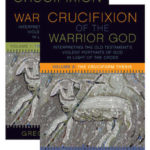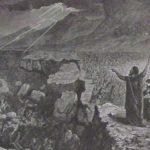We run our website the way we wished the whole internet worked: we provide high quality original content with no ads. We are funded solely by your direct support. Please consider supporting this project.

What is Progressive Revelation?
Some early church theologians argued that God had to relate to his people as spiritual infants, and over time, God’s people developed a capacity to receive clearer revelations of him. Gregory of Nazianzus, who wrote in the fourth century, claimed that God needed to allow aspects of fallen culture to get mixed in with his self-revelation; otherwise they would not have been capable of receiving it. God was acting like a wise physician who needs to blend flavorful juice with his nasty-tasting medicine.
As his people acclimated to the revelation they received, however, God was able to peel away layers of their fallen, culturally-conditioned beliefs and thereby reveal additional layers of truth about himself. This is progressive revelation.
One example of it is found in Gregory’s observation that God first “cut off the idol” from his people, but he “left the sacrifices.” Though we later learn that God doesn’t actually approve of animal sacrifices, God saw that his people at this time were too spiritually immature to abandon this barbaric practice. So, for a period of time, God graciously stooped to take on the appearance of a deity who enjoys, and even demands, the ritualistic killing of animals.
When the Israelites had grown more mature, Gregory argues, God “destroyed sacrifices,” but he “did not forbid circumcision,” though this too was also eventually removed. By taking incremental steps such as these, God grew his people to the point where at least some of them were ready to be freed completely from their past paganism. Gregory sums up the process by saying God “beguiled his people into the Gospel by gradual changes.”
This process culminated with God’s fullest and clearest revelation in Christ.
The proposal I make in Crucifixion of the Warrior God and Cross Vision is saying nothing more than this. I hold that God has always revealed his true character while stooping to accommodate the fallen and culturally conditioned state of his people as much as necessary. In his love, God was willing to allow his people to think of him along the lines of an ANE warrior deity, to the degree this was necessary, in order to progressively influence them to the point where they would be capable of receiving the truth that he is actually radically unlike these violent ANE deities. In this sense, I could agree with Gregory and say that, by making “gradual changes,” God “beguiled” his people “into the Gospel,” wherein it was revealed that God would rather be killed by enemies than to kill enemies.
—Bible, Revelation, Church Fathers
Adapted from Cross Vision, pages 72-74
Category: General
Tags: Cross Vision, Crucifixion of the Warrior God, Revelation
Related Reading

Podcast: Doesn’t Claiming that the Old Testament Writers were Sometimes Wrong Inevitably Lead to a Slippery Slope?
Greg talks about cataphatic prayer and the role of the imagination. http://traffic.libsyn.com/askgregboyd/Episode_0470.mp3

Crucifixion of the Warrior God Update
Did you know that authors generally don’t have much say-so about the cover art for their books? It’s considered part of the marketing, so the author may or may not like how it ends up looking. I’ve had a few book covers that made me scratch my head. (I won’t tell you which ones, but it would…

Four Principles of the Cruciform Thesis
In the second volume of Crucifixion of the Warrior God, I introduce how four dimensions of the revelation of God on the cross (as introduced in this post) lead to four principles that show us how to unlock aspects of the OT’s violent divine portraits and thus disclose how a given portrait bears witness to…

Revelation 17:8 refers to people whose names haven’t been written in “the book of life from the creation of the world.” Doesn’t this conflict with open theism?
As in Revelation 13:8, the clause “from the foundation” (apo kataboleis) need not mean “from before the foundation” but simply “from the foundation” (= since the foundation). It’s not that names either were or were not written in the “book of life” before they were ever born. Rather, throughout history, in response to the choices…

The REAL Problem with Divine Violence in the OT
As I mentioned in my previous blog, while I will continue to offer video-blogs responding to questions that come in, I’m also planning on sprinkling in reflections based on my forthcoming book, Crucifixion of the Warrior God, over the next couple months. Today, I just want to state what I consider to be the real…

Redefining Transcendence
God is transcendent, which basically means that God is “other” than creation. The problem is that classical thinking about God’s “otherness” has been limited to what reason can discern about God. As a result, all that can be said about his transcendence is what God is not. We are thus unable to acquire a positive…
